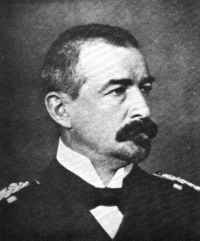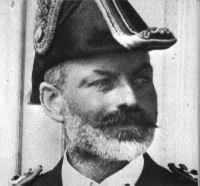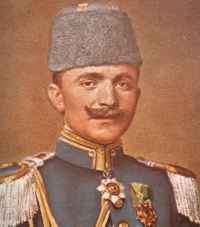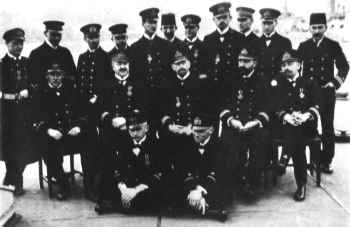The Pursuit of the Goeben and the Breslau
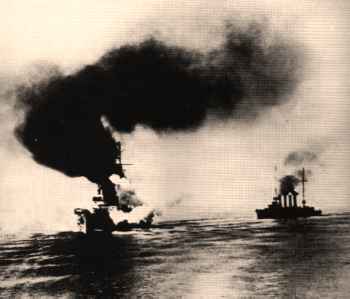 |
| The Goeben and the Breslau. |
Contributed by Paul Chrastina (Chrastina@aol.com) and Old News
|
This article originally appeared in the Dec-1995 issue of Old News (Vol 7, No 4) under the title German Warships Flee British Fleet. It is reproduced here with permission. If you have a little time to spare, you should follow this link to the ø Old News web site. While it's not dedicated to WWI, you never know what type of articles you'll find there but they're always history and they're always interesting. |
German Warships Flee British Fleetby Paul Chrastina
In the summer of 1914 the Imperial German Navy had only two warships stationed in the Mediterranean Sea. The battle cruisers Goeben and Breslau were under the command of Admiral Wilhelm Souchon, "a droop-jawed, determined little man." who was said to look "more like a parson than an admiral." As mounting international tensions pushed the nations of Europe toward war, Admiral Souchon found himself in a dangerous position. His two cruisers were outnumbered by the twenty-seven ships of Great Britain's Mediterranean fleet, a potential enemy. Admiral Souchon's heavy battle cruiser, the Goeben. was one of the fastest and most powerful warships of its day. Manned by over a thousand crewmen, the ship measured 640 feet in length, and carried 34 guns of various sizes. The Goeben's largest guns could accurately fire explosive shells at targets up to 15 miles away. Despite the Goeben's formidable size and weaponry, the two-year-old ship was plagued by defective coal-fired boilers that leaked water, causing a loss of power. Hoping to repair the Goeben before a war began, Admiral Souchon took the ship to the Adriatic port of Pola, which was controlled by Germany's Austrian allies. Souchon's other ship, the Breslau, was in good repair, but was a smaller and less powerful vessel, with a crew of 370. While the Goeben was being repaired in Pola, in July of 1914, the Breslau lay anchored off the southern coast of Italy. On August 1, 1914, Admiral Souchon received a wireless telegraph message informing him that Germany had declared war on Russia, and would soon declare war on France.
With the repairs to the Goeben's boilers still unfinished, Souchon departed from Pola on August 1 and steamed south to join the Breslau. The two ships then passed through the Straits of Messina. which separate Italy from Sicily. On August 3, 1914, while heading west off the coast of Sicily, Admiral Souchon received the expected news that Germany had declared war on France. He also received an unexpected change in his orders. After attacking the Algerian coast. he was no longer to sail west to the Atlantic Ocean. Instead, he was now ordered to turn around and sail east to Turkey. His new mission was to persuade the neutral Turkish government to enter the war on the side of Germany. Following his new orders, Souchon bombarded the French colonial ports of Philippeville and Bona, Algeria, on the morning of August 4. To confuse the French, during the bombardment he deceptively flew Russian flags, in violation of international treaties. The German ships then prepared to sail to Constantinople, Turkey, which lay 1.000 miles to the east. Lacking enough fuel for such a long passage, Admiral Souchon headed back toward Italy, where he had arranged to purchase additional coal. Souchon's new course was taking him toward Great Britain's Mediterranean fleet, which lay anchored south of Sicily. As far as Souchon knew, Britain was still neutral; but, in fact, Great Britain was preparing to declare war on Germany. The commander of the British fleet. Vice-Admiral Sir Archibald Berkeley Milne, had received orders from London instructing him to locate and track the German ships. Under international law, Milne was allowed to pursue, but not to attack, the German ships until hostilities were officially declared.
Admiral Milne sent his two strongest battle cruisers, the Indomitable and the Indefatigable, to search for the Goeben and the Breslau. As the British ships approached Algeria, they unexpectedly encountered the Goeben and the Breslau coming straight toward them. Mutually surprised, the two sets of heavily armed ships passed one another at high speed. Neither side offered the customary peacetime salutes. Instead, each ship's crew stood ready at their guns to return fire if they were attacked. After passing the Germans, the Indomitable and the Indefatigable circled around and began to follow the Goeben and the Breslau back toward Italy. At two o'clock in the afternoon, Souchon ordered his engine room to put on full speed, in an effort to shake off the trailing British ships. The German ships began to pull away from the British, but the intense heat took its toll on the German engine stokers, many of whom began to pass out while shoveling coal into the huge furnaces below decks. As the Goeben reached full speed, a defective valve ruptured, releasing into the engine room a cloud of superheated steam that killed four men. Despite the trouble with the Goeben's engines, the Germans outran the British ships. By nightfall on August 4, along the north coast of Sicily, the Goeben and the Breslau pulled out of sight of their pursuers. Ignoring international law, Souchon entered neutral Italian waters and anchored his ships at the port of Messina, where merchant German coal ships were waiting for him. Nervous Italian authorities gave the German captain twenty-four hours to refuel and leave. Admiral Milne meanwhile obeyed the letter of international law, and did not pursue the German ships into neutral Italian waters. Instead, he deployed the Indomitable and the Indefatigable west of Messina, where the Germans were refueling. Thinking that Souchon was either going to make a break for the Atlantic or else return to the port of Pola in the Adriatic, Milne failed to block the German's route toward Turkey. At Messina, Souchon' s crew impatiently tore the decks off the merchant coal ships, transferring 1,500 tons of fuel to the Goeben and the Breslau. This was enough coal to reach the Aegean Sea, where Souchon had arranged to meet another merchant collier. While the Goeben and the Breslau took on coal, their officers grimly made out their wills and wrote letters to their families in Germany, believing that they were likely to be captured or sunk by the pursuing British fleet within hours. Souchon received a telegram from Berlin informing him that, unfortunately, the Turkish government had not yet agreed to allow his ships to enter the harbor at Constantinople. With Italian officials urging him to leave immediately and the British fleet waiting for him in the open waters of the Mediterranean, Souchon boldly decided to head for Constantinople anyway. He later said that he felt sure that he could "force the Turks, even against their will. to spread the war to the Black Sea against their ancient enemy, Russia." The Goeben and the Breslau prepared to sail south out of Messina harbor at midnight, August 5. Britain officially went to war with Germany at the same time. As the Goeben and the Breslau left the harbor, their crews fully expected to find the powerful British navy waiting to pounce on them. Admiral Milne. however, had only posted one ship, a light cruiser named Gloucester, at the exit from the harbor. The Gloucester sighted the fleeing German ships by the light of a full moon and reported to Milne that they were unexpectedly heading east. For the rest of the night, the single British ship cautiously trailed the Goeben and the Breslau. Maintaining full speed, Souchon did not want to waste any time or fuel by firing on the Gloucester, but instead tried unsuccessfully to jam the British ship's radio-telegraph transmissions to Admiral Milne. The next morning, the Gloucester closed in and opened fire on the Breslau, and was in turn fired upon by the Goeben. None of the ships was hit during the exchange. Careful not to stress the Goeben's engines, Souchon broke off the encounter and continued eastward, hoping to shake off the Gloucester and meet with his next coal ship in the Aegean Sea. Near the western coast of Greece, the pursuit of the Goeben and the Breslau was taken up by four more British ships, led by Milne's second-in-command, Admiral E. C. Troubridge. Troubridge's ships were smaller and faster than the Goeben, but their guns were also smaller, and could not match the range of the Goeben's ordnance. As Troubridge's light cruisers closed in on the fleeing German ships, a British gunnery officer quickly calculated the difference between the range of the British and German guns. The officer persuaded Troubridge that the Goeben would be able to "pick them off" at leisure before they could ever get close enough to attack. Troubridge kept his distance from the Goeben and the Breslau. Confident that he now had the German ships trapped in the eastern Mediterranean, Admiral Milne ordered the Gloucester and Troubridge's cruisers to give up the chase. Never suspecting that Souchon might be headed for Turkey, Milne sent some ships to the southeast to guard the Suez Canal from possible German attack. At 5:00 pm on August 10, the Goeben and the Breslau reached the entrance to the port of Constantinople. Admiral- Souchon's orders instructed him to force his way into the port if necessary. "Enter." the orders read. "Demand surrender of forts. Capture pilot."
In Constantinople, both German and British diplomats were meeting behind closed doors with members of the Turkish government. When the German diplomats were informed of the arrival of the Goeben and the Breslau, they persuaded the Turks to allow the ships to enter the harbor. Admiral Souchon, expecting Turkish resistance, was surprised when a small boat came out and volunteered to guide his ships through the minefields that protected the harbor. Once Souchon's ships were safely in the harbor, the German diplomats reminded the Turks that Great Britain had recently broken a contract to supply two new battleships to the Turkish government. The British Admiralty, nervous about the threat of a European war, had decided to keep the new warships for its own use instead of transferring them to Turkey. The Germans now offered to provide the Turks with the ships they needed by selling them the Goeben and the Breslau. After several hours of negotiation, the Turks agreed to purchase the German battle cruisers from Germany. Retaining their German crews, the ships were renamed the Yavuz Sultan Selim and the Midili. Wilhelm Souchon was made commander-in-chief of the Turkish navy. Souchon made overdue repairs to the Goeben's boilers, then took the ships into the Black Sea, where he bombarded the Russian cities of Odessa, Sebastopol and Novorossiysk without the knowledge or consent of the Turkish government. On October 30, 1914. Turkey officially joined the war on the German side, substantially won over by the acquisition of the powerful, though somewhat autonomous, German warships. The escape of the Goeben and the Breslau effectively ended the careers of British admirals Milne and Troubridge. Milne served out the rest of the war without commission on half-pay, while Troubridge was assigned to land-based duties below his rank for the remainder of the war. Only the captain of the Gloucester received commendation, for having at least exchanged gunfire with the fleeing Goeben and Breslau.
|


